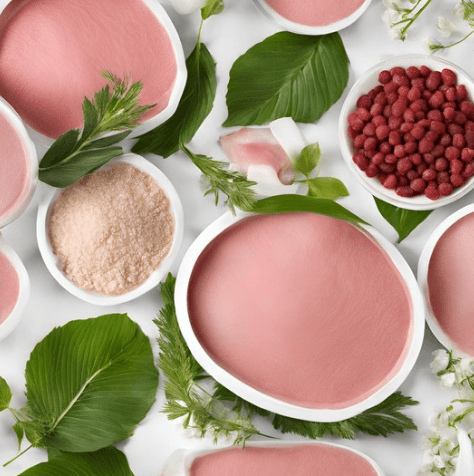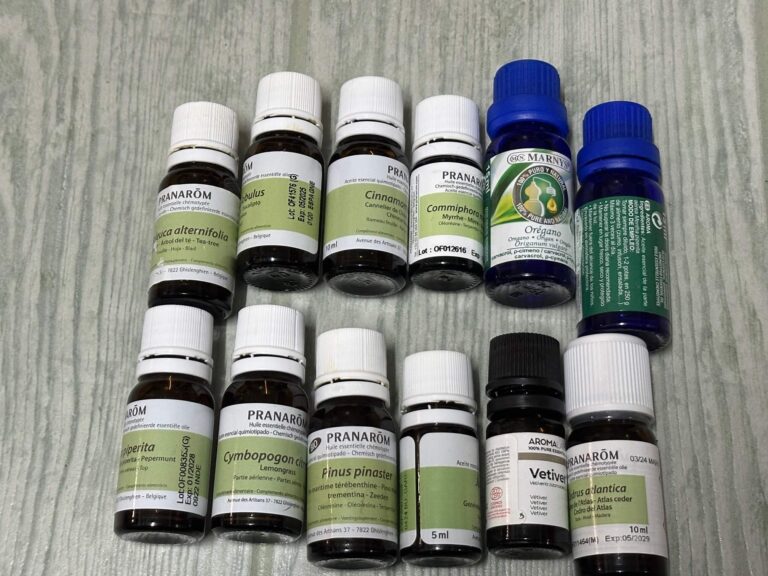Benefits of Berberine: What You Need to Know
I want to start this post by saying that berberine has surprised me in so many ways.
When I first heard about it, I thought it was just another trendy supplement making waves online. You know, the kind that influencers hype up for a few months before moving on to the next shiny thing. But when I dug deeper and actually tried it, my opinion changed.
So let’s talk about the benefits of berberine, how it works, what it can do for your health, the side effects you should be aware of, and of course, my own experiences.
This post contains affiliate links. I may earn a small commission, at no extra cost to you.

What is Berberine?
Berberine is a natural compound found in plants like barberry, goldenseal, Oregon grape, and tree turmeric. People have been using it for centuries in traditional Chinese and Ayurvedic medicine.
It comes from the root, rhizome, and bark of these plants. That’s why most berberine supplements you see at the store (like the one I’m holding in the photo, from Solaray) are labeled as “root extract.”
The cool part is that berberine has been studied quite a bit. Unlike some supplements where the science is shaky, berberine actually has a solid base of research behind it.
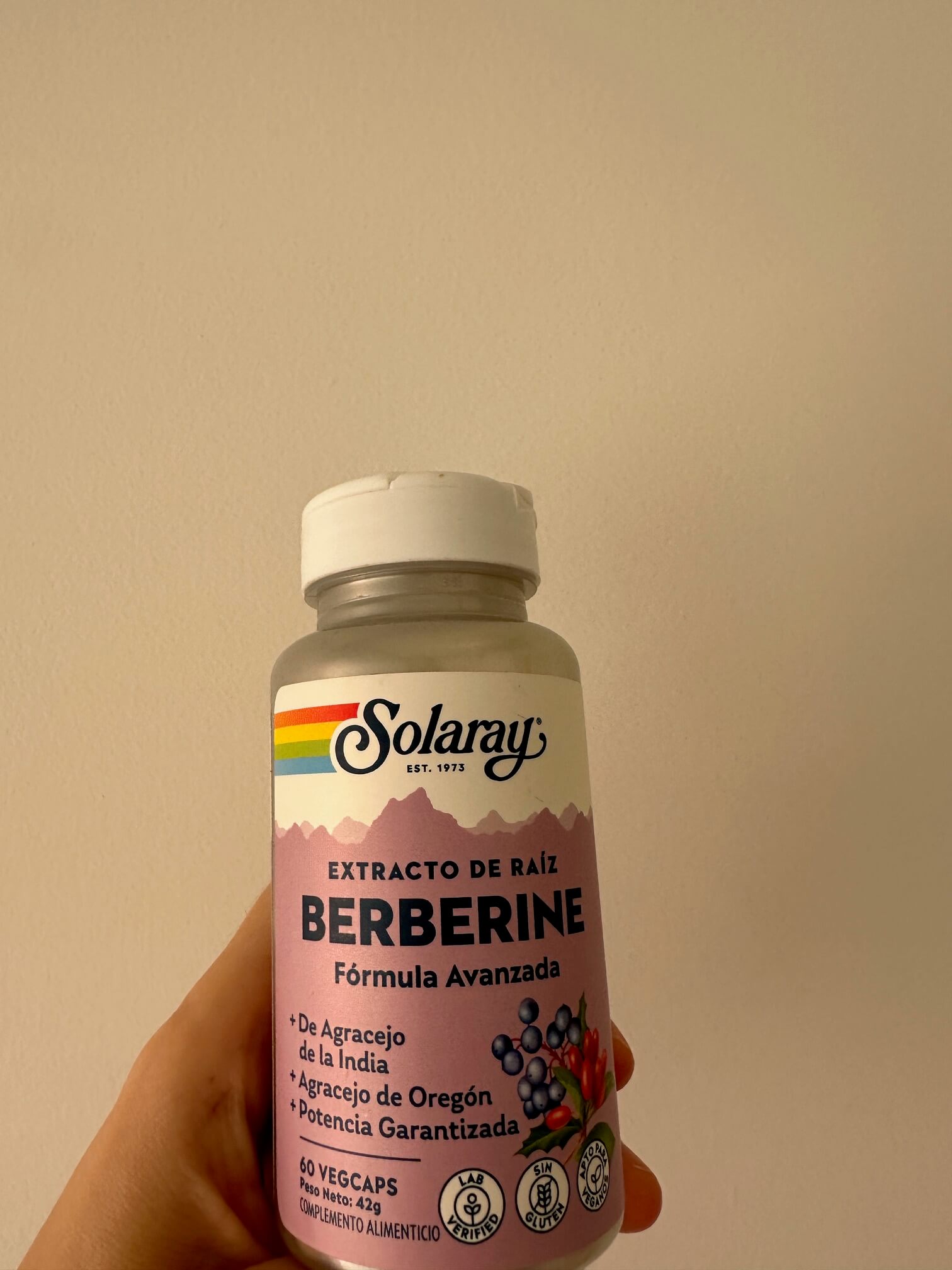
Berberine Benefits
Here are some of the biggest berberine benefits you’ll see mentioned again and again:
- Supports healthy blood sugar levels
- Helps with cholesterol balance
- Can aid in weight management
- Supports gut health
- May have anti-inflammatory properties
- Improves metabolic health overall
Now, let’s break these down into ideas that are easier to digest.
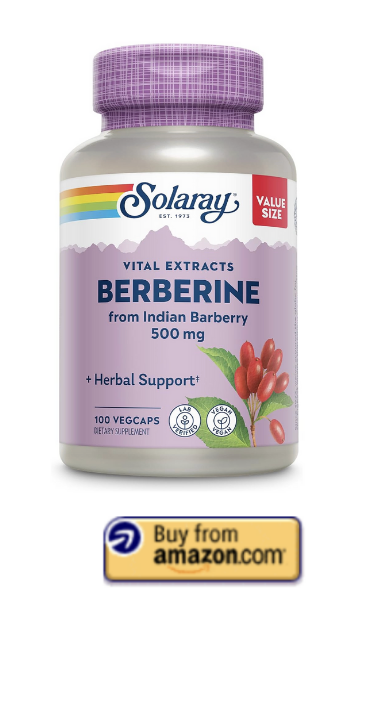
Berberine for Blood Sugar Support
This is probably the most famous benefit.
Studies show berberine can help people with insulin resistance and support balanced blood sugar. Some people even compare its effect to metformin, a prescription drug used for type 2 diabetes (Wang et al., 1017).
For me personally, I noticed less of that “sugar crash” feeling after meals when I started taking it. Normally, I’d have a carb-heavy lunch and then feel like napping an hour later. Berberine made that slump less dramatic.
If you’re someone who struggles with energy swings or has been told your blood sugar is creeping up, this is one of the biggest reasons to look into berberine.

Berberine and Weight Management
I’m not going to pretend that berberine is a magic pill for weight loss. It’s not.
But here’s what I did notice. I started taking berberine along with a higher-protein diet, and my cravings were a little less intense. It wasn’t like a switch flipped, but more like my appetite was steadier.
Science backs this up too. Some research suggests berberine helps regulate metabolism, which can make it easier to manage weight when combined with diet and exercise.
Berberine Benefits for Women
This is a big one.
Berberine is often talked about for women with PCOS (polycystic ovary syndrome). Since PCOS is linked to insulin resistance and hormone imbalances, berberine may help regulate cycles, support healthy ovulation, and even improve fertility in some cases.
I don’t have PCOS myself, but I know women who’ve used berberine along with inositol (another supplement) and saw real improvements in their cycles.
So if you’re a woman looking into berberine, know that this is one of the main reasons it’s gaining attention.

Berberine for Cholesterol and Heart Health
Another big benefit of berberine is how it impacts cholesterol.
Studies suggest berberine can lower LDL cholesterol (the “bad” one) and raise HDL cholesterol (the “good” one). It may also reduce triglycerides.
I haven’t tested my cholesterol before and after taking berberine, so I can’t give a personal “berberine before and after” story here. But if you’ve been told to keep an eye on your heart health, berberine might be worth considering.
Berberine and Gut Health
Here’s a fun fact: berberine has antimicrobial properties.
That means it can help balance the bacteria in your gut. Some people even use it as a natural way to deal with gut infections.
When I first took berberine, I noticed some mild stomach discomfort for the first few days. This is common. But once my body adjusted, I felt fine, and I do think it helped with bloating over time.
How to Take Berberine
Alright, let’s get practical.
The typical berberine dosage ranges from 500 mg to 1500 mg per day, usually split into 2 or 3 doses.
Why split it up? Because berberine doesn’t stay in your system very long. Taking it multiple times a day keeps your levels steady.
Best time to take berberine: most people suggest before meals. I usually take mine 15–20 minutes before eating.
If you’re wondering about foods with berberine, you’ll find small amounts in barberries, Oregon grape, and goldenseal. But realistically, you’d have to eat a lot of those to get the same effect as a supplement.
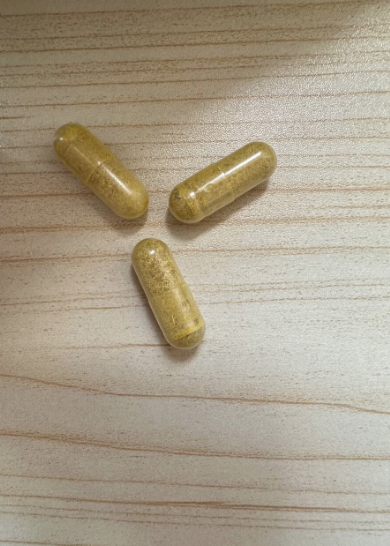
Berberine Side Effects
This is important.
The most common berberine side effects are:
- Stomach discomfort
- Cramping
- Diarrhea or constipation
- Headache
I personally had mild bloating the first week. Nothing major, but noticeable.
Most people find that these side effects fade once their body adjusts. But if you have a sensitive stomach, start with a lower dose and build up.
And always check with your doctor before starting, especially if you’re on medications.
Best Berberine Supplement
There are a ton of options out there.
I picked Solaray (the one in my photo) because I’ve used their brand before and trust their quality. But there are plenty of other good ones like Thorne, NOW Foods, and Berberine HCL brands.
When choosing the best berberine supplement, here’s what I look for:
- Clear labeling of dosage
- Third-party testing
- No weird fillers
- Positive reviews

Table: Quick Breakdown of Berberine
| Benefit | What It Helps With | Notes |
|---|---|---|
| Blood sugar | Insulin resistance, energy crashes | Works similar to metformin |
| Weight | Appetite, metabolism | Works best with diet and exercise |
| Women’s health | PCOS, hormone balance | Often combined with inositol |
| Cholesterol | LDL, HDL, triglycerides | Supports heart health |
| Gut health | Bacteria balance | May cause stomach upset at first |
Inositol and Berberine
I want to mention this combo because it’s very popular among women with PCOS.
Inositol supports insulin sensitivity and hormone balance. Pairing inositol and berberine may give better results than either alone.
I’ve tried inositol separately and liked it for mood support. Adding berberine into the mix felt like a nice extra layer.
Berberine Before and After
This is where it gets fun.
If you type “berberine before and after” into Google or YouTube, you’ll find tons of personal stories. Some people lose weight, others report better energy, and some see big changes in bloodwork results.
For me, my main “before and after” was energy levels. Before, I had crazy sugar crashes. After a few weeks on berberine, that rollercoaster smoothed out.
Not a miracle, but a noticeable difference.
FAQ: Berberine
Q: What is berberine?
A: A natural plant compound found in barberry, goldenseal, and other plants.
Q: How to take berberine?
A: Typically 500–1500 mg per day, split into 2–3 doses before meals.
Q: Best time to take berberine?
A: Before meals, 15–20 minutes prior.
Q: Is berberine safe?
A: Generally, yes, but it can cause stomach issues. Always check with your doctor if you’re on medications.
Q: Can you get berberine from food?
A: Yes, from foods like barberries and Oregon grape, but not in large enough amounts for therapeutic effects.
Q: Who should avoid berberine?
A: Pregnant or breastfeeding women, and people on certain medications (like blood sugar or blood pressure meds) unless cleared by a doctor.
The One I use: Solaray Berberine: Benefits, Dosage, and My Thoughts
If you’ve been curious about berberine supplements, chances are you’ve come across the Solaray brand. That’s the one you see in the photos above. It’s a berberine root extract formula that combines two main sources:
- Oregon Grape Root (Berberis aquifolium) – 285 mg
- Berberine HCl (from Indian Barberry root) – 250 mg
That means you’re getting 535 mg per capsule, which is actually a pretty solid dose compared to many berberine supplements on the market.
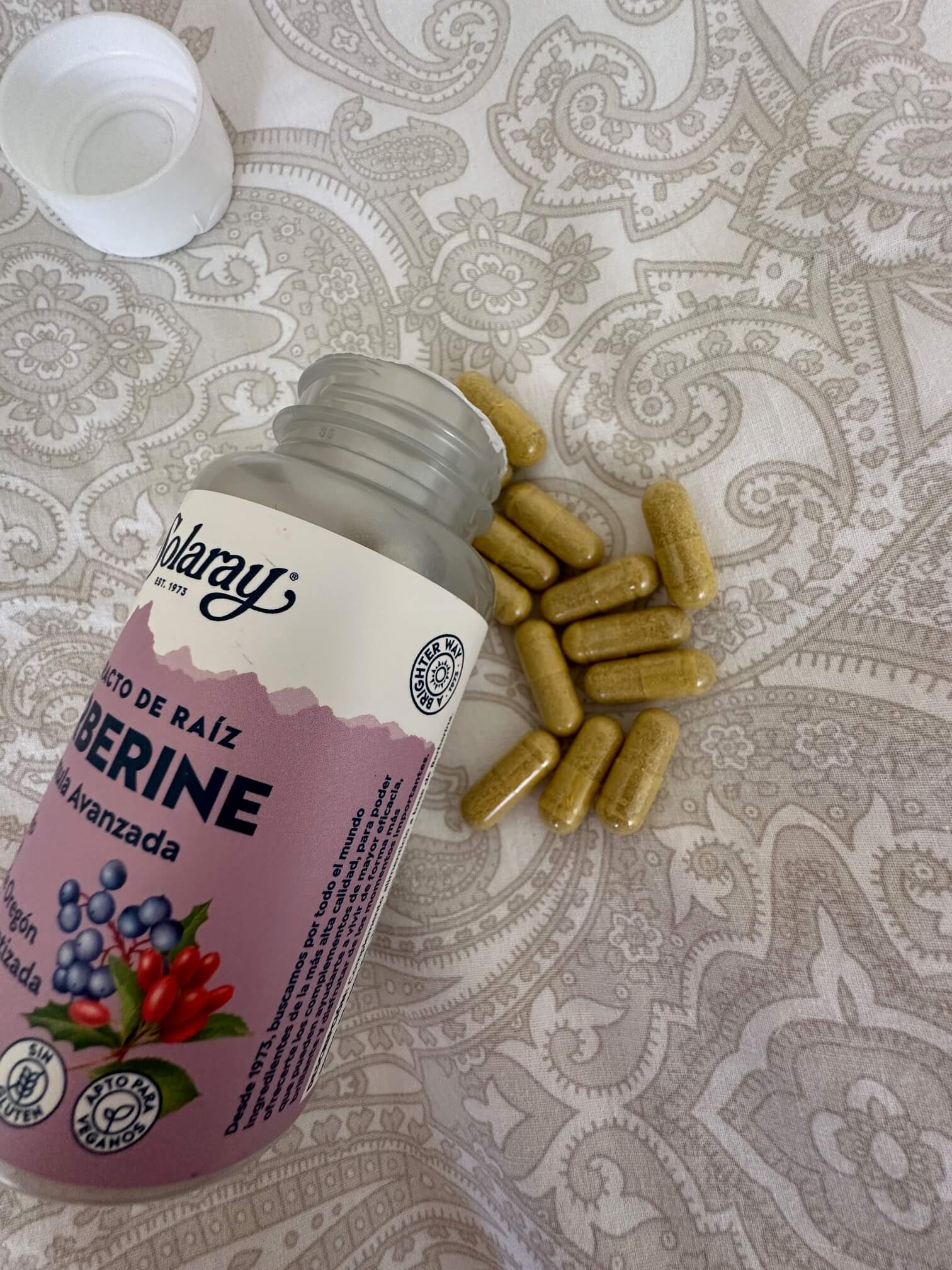

Why I Picked This One
There are tons of berberine supplements out there, so why Solaray?
For me, it came down to a few things:
- Brand reputation: Solaray has been around since the 1970s, and they’re known for clean formulations.
- No gluten or unnecessary fillers: It says “sin gluten” on the label and you can see it’s basically just plant cellulose for the capsule.
- Lab verified: That little icon on the label means it’s tested for potency and purity, which gives me more peace of mind.
How I Take It
The instructions say: one capsule per day, preferably outside of meals.
That’s interesting because a lot of berberine guides say to take it before meals to help with blood sugar. Solaray suggests outside of meals, which could mean between breakfast and lunch, or before bed.
Personally, I tried it both ways. If I take it on a completely empty stomach first thing in the morning, it sometimes gives me mild stomach gurgling. Taking it right before a meal feels better for me, especially if the meal has carbs.
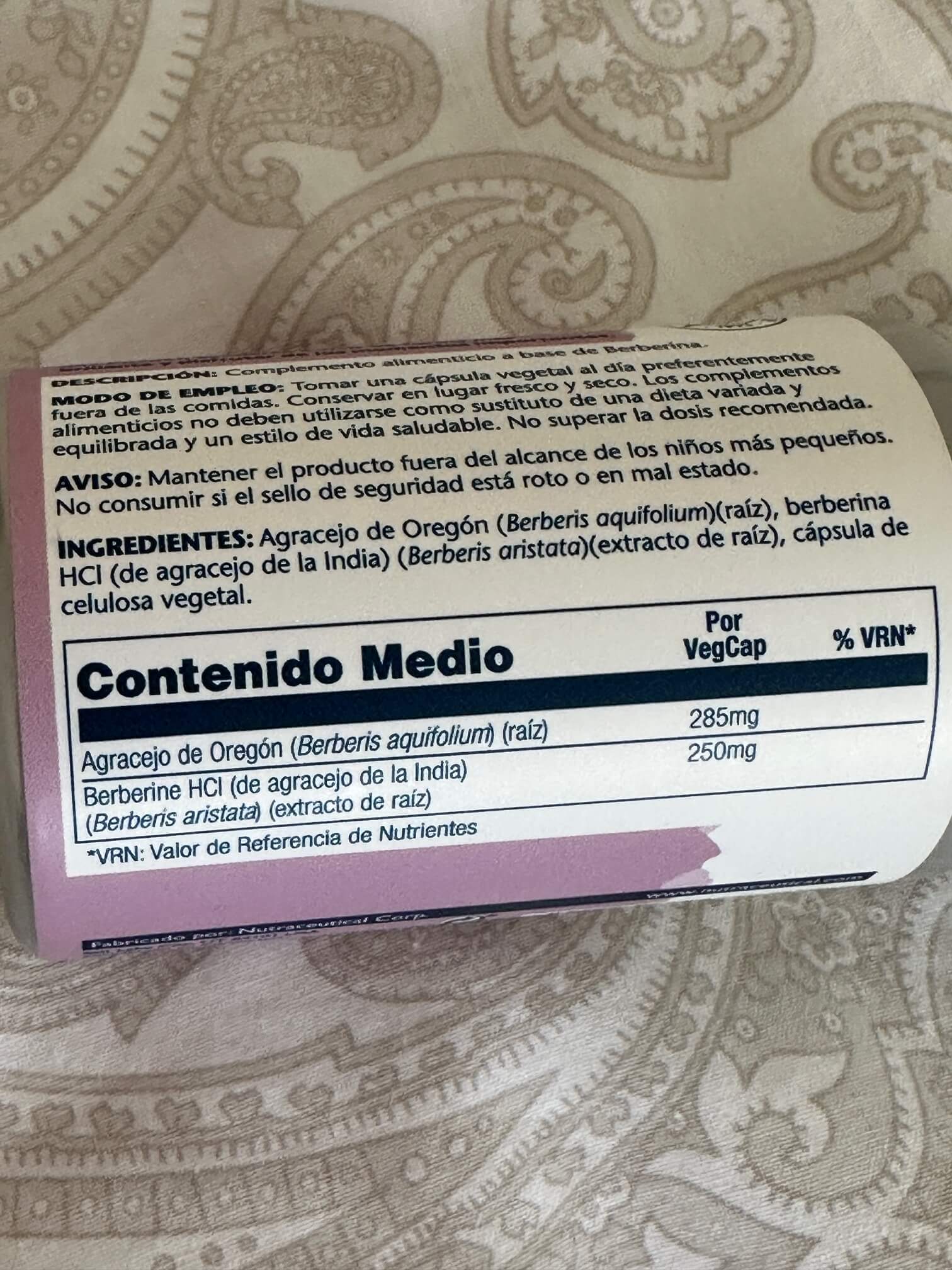
Benefits I Noticed
After using Solaray Berberine for a while, here are some things I’ve noticed:
- Energy stability: I don’t crash as hard after meals.
- Less bloating: My stomach feels calmer, probably from the gut-balancing effect.
- Better appetite control: Not a magic fix, but I snack less randomly.
I can’t say I’ve seen massive weight loss just from this, but I do feel it supports my metabolism in the background.
The Capsules
You can see in the photo that the capsules are yellowish-golden. That’s the natural color of berberine (kind of turmeric-like). They’re not huge, and I find them easy to swallow.
One capsule gives you 535 mg total, so if you’re aiming for the commonly studied dose of 1000–1500 mg/day, you’d need to take 2–3 of these spread throughout the day.

Side Effects
The only downside I had was mild stomach discomfort in the beginning.
If you’re sensitive, I recommend starting with one capsule a day and seeing how you feel. Drinking plenty of water with it helps too.
Comparisons
- Some berberine HCl supplements on the market give you 500 mg in one capsule. This one gives you a little extra (535 mg) because it’s a blend.
- Unlike some cheap brands, this one is lab tested and comes from a trusted company.
- It doesn’t include extras like cinnamon or inositol, so if you want those benefits you’d need to add them separately.
Final Thoughts
I think the Solaray Berberine is a solid choice if you’re looking for:
- A clean, no-filler supplement
- A reliable dosage (535 mg per capsule)
- Something you can take once or twice daily without having to swallow a ton of pills
For me, the main benefits of berberine with this brand were steady energy, less bloating, and better appetite control.
If you’re curious about berberine before and after, the changes aren’t dramatic overnight, but with consistent use, you can definitely feel the difference in your metabolism and digestion.
So there you have it.
Berberine benefits are pretty impressive. From blood sugar support to weight management, cholesterol balance, women’s health, and gut health, this supplement covers a lot of ground.
I’ve shared my personal experiences, some comparisons, tips on how to take berberine, and even a few of the side effects to watch out for.
This post showed you the benefits of berberine, you may also like: tips on inositol, natural supplements for energy, and foods that balance blood sugar.

Bibliography
Wang, H., Zhu, C., Ying, Y., Luo, L., Huang, D., & Luo, Z. (2017). Metformin and berberine, two versatile drugs in treatment of common metabolic diseases. Oncotarget, 9(11), 10135.



